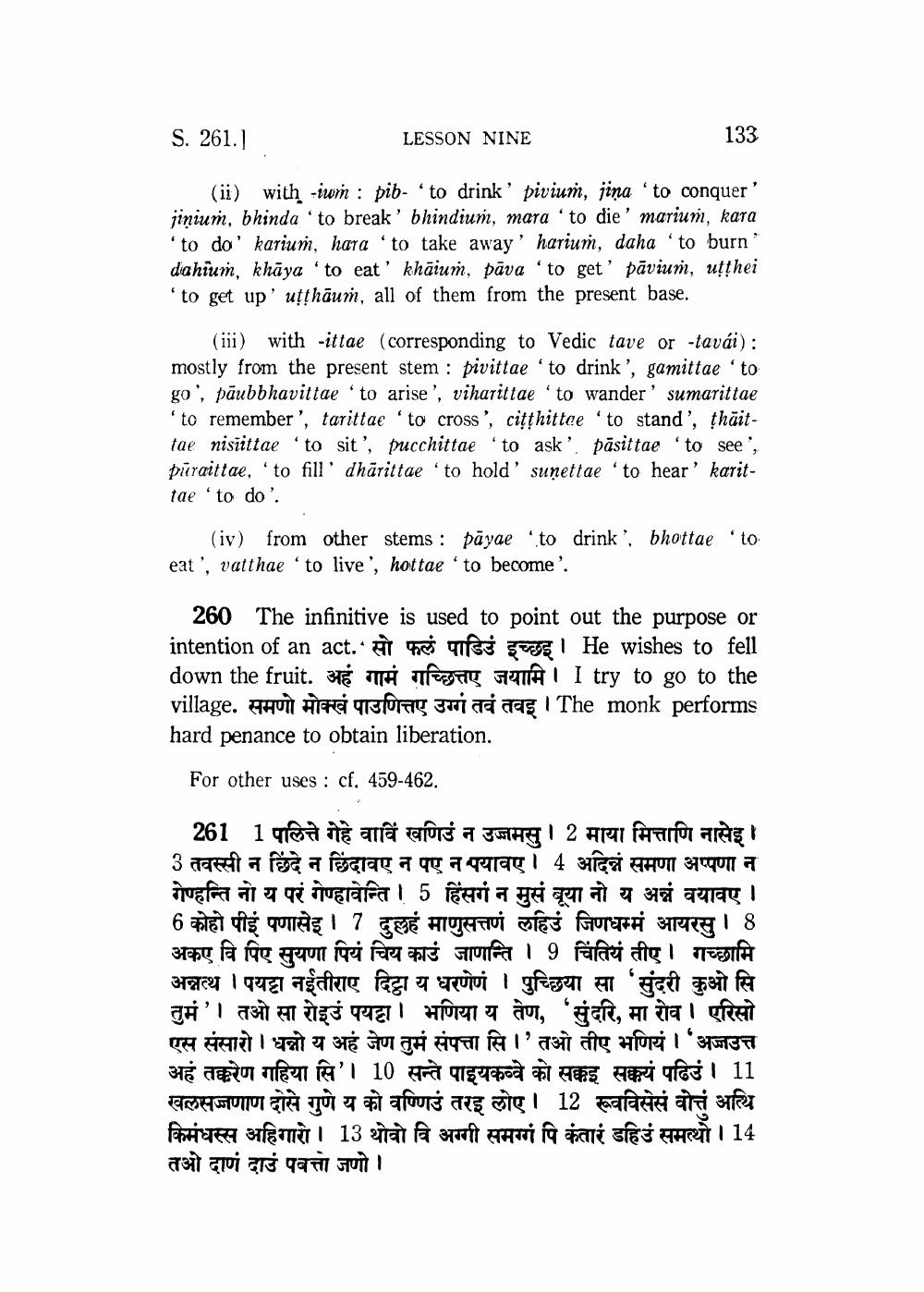________________
S. 261.]
LESSON NINE
133
(ii) with -ium : pib- 'to drink' pivium, jina to conquer' jiņium, bhinda 'to break' bhindium, mara 'to die' marium, kara 'to do'karium, hara 'to take away' harium, daha 'to burn" dahium, khāya to eat' khaium, pāva to get' pāvium, utthei to get up' utthāum, all of them from the present base.
(iii) with -ittae (corresponding to Vedic tave or -tavai) : mostly from the present stem: pivittae 'to drink', gamittae 'to go', pāubbhavittae 'to arise', viharittae 'to wander' sumarittae 'to remember', tarittae 'to cross', citthittee 'to stand', thāittae nisiittae 'to sit', pucchittae 'to ask'. päsittae 'to see, puraittae, 'to fill' dhārittae 'to hold' sunettae 'to hear' karittae 'to do'.
(iv) from other stems : pāyae to drink', bhottae 'to eat', vatthae 'to live', hottae 'to become'.
260 The infinitive is used to point out the purpose or intention of an act. सो फलं पाडिउं इच्छइ । He wishes to fell down the fruit. अहं गाम गच्छित्तए जयामि । I try to go to the village. समणो मोक्खं पाउणित्तए उग्गं तवं तवइ । The monk performs hard penance to obtain liberation.
For other uses : cf. 459-462.
261 1 पलित्ते गेहे वाविं खणिउं न उज्जमसु । 2 माया मित्ताणि नासेइ । 3 तवस्सी न छिंदे न छिंदावए न पए न पयावए। 4 अदिन्नं समणा अप्पणा न गेण्हन्ति नो य परं गेण्हावेन्ति । 5 हिंसगं न मुसं बूया नो य अन्नं वयावए । 6 कोहो पीइं पणासेइ। 7 दुल्लहं माणुसत्तणं लहिउं जिणधम्मं आयरसु। 8 अकए वि पिए सुयणा पियं चिय काउं जाणन्ति । 9 चिंतियं तीए। गच्छामि अन्नत्थ । पयट्टा नईतीराए दिट्ठा य धरणेणं । पुच्छिया सा 'सुंदरी कुओ सि तुमं'। तओ सा रोइडं पयहा। भणिया य तेण, 'सुंदरि, मा रोव । एरिसो एस संसारो । धन्नो य अहं जेण तुमं संपत्ता सि ।' तओ तीए भणियं । 'अजउत्त अहं तक्करेण गहिया सि'। 10 सन्ते पाइयकव्वे को सक्कइ सक्कयं पढिउं । 11 खलसजणाण दोसे गुणे य को वण्णिउं तरइ लोए। 12 स्वविसेसं वोत्तं अस्थि किमंधस्स अहिगारो। 13 थोवो वि अग्गी समग्गं पि कंतारं डहिउं समत्थो । 14 तओ दाणं दाउं पवत्तो जणो ।




